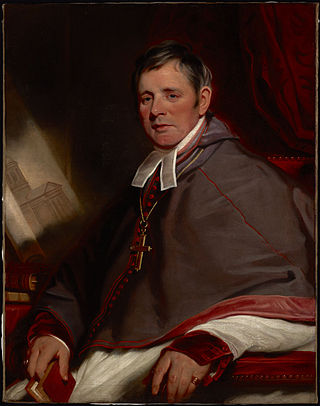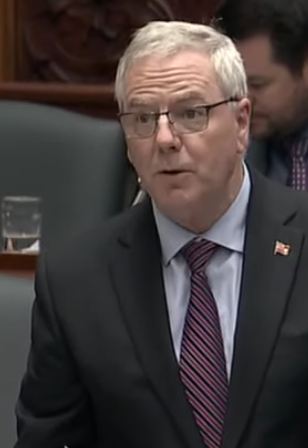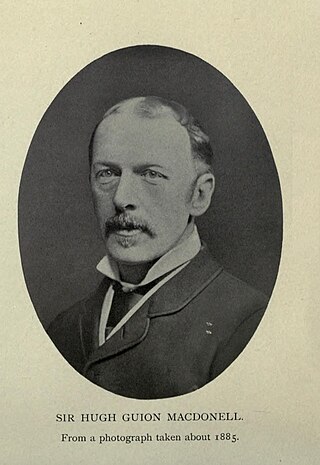
This section of the Timeline of Quebec history concerns the events in British North America relating to what is the present day province of Quebec, Canada between the time of the Constitutional Act of 1791 and the Act of Union 1840.

John Sandfield Macdonald, was the joint premier of the Province of Canada from 1862 to 1864. He was also the first premier of Ontario from 1867 to 1871, one of the four founding provinces created at Confederation in 1867. He served as both premier and attorney general of Ontario from July 16, 1867, to December 20, 1871.

Alexander Macdonell was the first Roman Catholic bishop of Kingston, Upper Canada.
John White was a lawyer and politician in Upper Canada. He was the first Attorney General for Upper Canada. He wrote and was responsible for the legislation of the new Province, which stemmed from the partition of Quebec in the Constitutional Act of 1791. His Act to limit slavery, which relied on Christian argument, was the first such enactment ever in the world.

Hugh MacDonell of Aberchalder (1753-1847) was a soldier and political figure in Upper Canada.
Alexander Macdonell of Collachie was a soldier and political figure in Upper Canada.
Angus MacDonell was a soldier and political figure in Upper Canada.

Alexander Fraser was a soldier and political figure in Upper Canada.
Samuel Street was a Canadian judge, merchant and political figure in Upper Canada. He was born in Wilton, Connecticut and traded with indigenous people during the American Revolution. He moved to Fort Niagara and opened a business to provide supplies to the British and later trade with indigenous people and the Indian Department. He was also a land speculator for the Niagara area. In 1796 he was elected to the Legislative Assembly of Upper Canada in the constituency of the 2nd riding of Lincoln and became speaker of the legislature in 1800. He lost his subsequent campaign for reelection but was elected to the constituency of the 3rd riding of Lincoln in 1808 and was elected again to become the speaker. During the War of 1812 he became a paymaster for Oxford and Lincoln militias and was appointed as acting deputy paymaster for the British militia. He died in Thorold, Upper Canada.
Donald Aeneas MacDonell was a soldier and political figure in Upper Canada.
Donald Macdonell of Greenfield was a political figure in Upper Canada.

Chief Justice The Hon. Archibald McLean was a lawyer, judge and political figure in Upper Canada.
Lt. Col. The Hon. Neil McLean was a judge and political figure in Upper Canada.

Jean-Antoine Panet was a notary, lawyer, judge, seigneur and political figure in Lower Canada.

Aberchalder is a small settlement and estate at the northern end of Loch Oich in the Scottish Highlands and is in the Highland council area of Scotland. It lies on the A82 road and is situated in two parishes, Boleskine and Kilmonivaig. Fort Augustus is within 5 mi (8.0 km).
Alexander Macdonell of Greenfield was a Canadian businessman and politician. He was the fourth son of Alexander Macdonell of Greenfield and Janet Macdonell of Aberchalder. He was also the cousin and brother-in-law of Miles MacDonell, the first governor of the Red River Colony.

James A. McDonell is a Canadian politician. He was a Progressive Conservative member of the Legislative Assembly of Ontario who represented the riding of Stormont—Dundas—South Glengarry. He has been an MPP from 2011 until his retirement in 2022. He was mayor of the township of South Glengarry, Ontario from 2003 to 2011.

John MacDonald of Garth was a colourful character involved in the Canadian fur trade. He was an enthusiastic duellist and a shrewd businessman who became a partner in the North West Company and a member of the Beaver Club at Montreal, Lower Canada. In an account of his exploits, he was described as having "indomitable courage... brave, reckless and domineering, with a decided tendency to seek redress with his own hands," characteristics that made him well-suited to his profession. Built in 1816, his home, Inverarden House, near Cornwall, Upper Canada, was later designated a National Historic Site of Canada. According to the 1997 book Lords of the North, by James McDonell and Robert Campbell, the Hotel Macdonald in Edmonton, Alberta was named for him.

Sir Hugh Guion MacDonell was a British diplomat who was envoy to Brazil, Denmark and Portugal.
George Greenfield Macdonell was from a prominent family in Upper Canada. He was the first son of Alexander Macdonell of Greenfield, a nephew of John Macdonell of Greenfield and Donald Macdonell of Greenfield, and a great-nephew of Sir Hugh MacDonell of Aberchalder and John McDonell of Aberchalder.